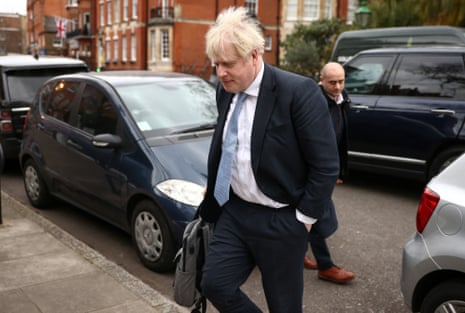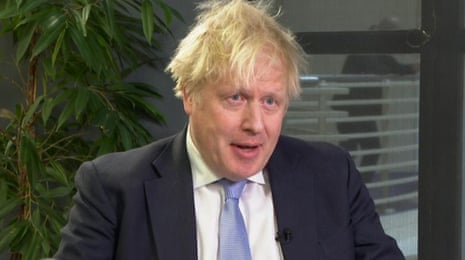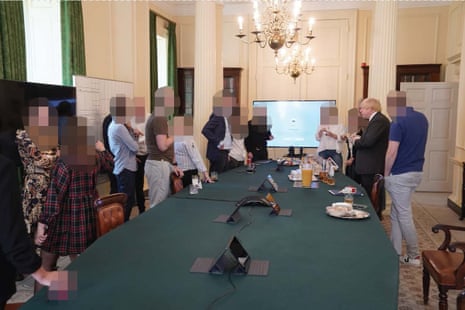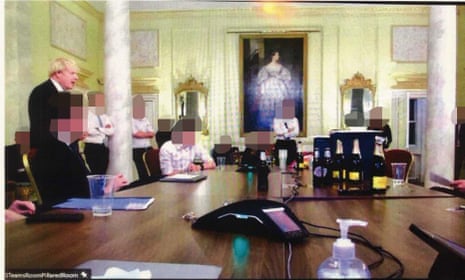Key events
-
Afternoon summary
-
Former civil service chief says it’s ‘patently absurd’ to say Sue Gray part of plot to bring down Johnson
-
Johnson needs to explain why he did not correct record ‘at earliest opportunity’, says privileges committee
-
Johnson declines to criticise his supporters who are now saying Sue Gray’s report discredited
-
Johnson says he would have queried Sue Gray’s independence during Partygate if he had known she would join Labour
-
People ‘standing 4-5 deep’ at No 10 leaving do attended by Johnson, says privileges committee report
-
Johnson ally suggests Tory MPs should try to block privileges committee inquiry
-
Johnson’s allies claim Gray report discredited, with Nadine Dorries saying it was written to bring him down
-
Labour says privileges committee evidence ‘absolutely damning’ about Johnson
-
Boris Johnson occasionally joined drinks gatherings in No 10 press office on Friday evenings during Covid, report says
-
What privileges committee says about how Johnson may have misled MPs about Partygate
-
Privileges committee rejects Johnson’s claim its findings based on Sue Gray’s report
-
Privileges committee says ‘reluctance’ of No 10 to hand over evidence when Johnson was PM held up inquiry
-
Boris Johnson claims he has been ‘vindicated’ by report, and criticises committee for relying on Gray’s evidence
-
Partygate: official said No 10 worried ‘about leaks of PM having piss up’ and added ‘I don’t think it’s unwarranted’
-
‘Struggling [to see] how this one is in rules’ – new evidence released to back claims Johnson misled MPs over Partygate
-
Boris Johnson to give evidence to privileges committee inquiry into claims he misled MPs in week starting 20 March
-
Civil servants’ union leader says it is ‘nonsense’ to think Sue Gray will pass government secrets to Labour
-
Gray appointment ‘undermines civil service’ and raises questions about Starmer’s judgment, says Johnson’s former PPS
-
Sue Gray hasn’t been hired to ‘spill the beans’ and won’t be involved in election campaigning, says Labour
-
Neil Coyle should be suspended from Commons for five days for bullying and harrassment, report says
-
Sue Gray appointment raises ‘tricky questions’ about trust between ministers and civil servants, says IfG thinktank
-
‘Utterly ludicrous’ to claim hiring Sue Gray means Partygate report was biased, says Labour
Afternoon summary
For all the extra shocking details [the committee] have published, their argument appears to be very straightforward: Johnson announced the rules, broke the rules and then denied that the rules had been broken.
It would have been obvious to the prime minister, they suggest, that his presence at these gatherings was against the guidance, and therefore he could not claim to have been ignorant of parties or to have needed assurances that they were above board. These are core parts of Johnson’s defence, according to the statement he put out within minutes of the interim report’s publication.
The almost 500-word justification and a subsequent television appearance from Johnson showed he was in full fightback mode. Johnson claimed the report had vindicated him because there was nothing saying he had misled parliament knowingly or recklessly. The committee may not yet have concluded definitively that Johnson misled the Commons, but in no way does it put him in the clear.
Rowena’s full analysis is here.

Former civil service chief says it’s ‘patently absurd’ to say Sue Gray part of plot to bring down Johnson
In an article for the Guardian Bob Kerslake, a former head of the civil service, says that the theory that Sue Gray set out to bring down Boris Johnson is “patently absurd”. He is referring to claims made by Tories such as Jacob Rees-Mogg (see 11.09am) and Nadine Dorries (see 4.31pm).
Kerslake says:
The notion that Gray was part of a “stitch-up” of Boris Johnson and his government through her role in leading the Partygate inquiry is patently absurd. Sue had left her ethics role to work in Michael Gove’s department when the inquiry began, and took on the lead role only when the cabinet secretary, Simon Case, recused himself from the role. At that time, there was no vacancy for Labour’s chief of staff role.
Gray’s report was hard hitting but scrupulously fair, and indeed the prime minister argued when it was published that he had been exonerated by it. Conspiracy theorists should not waste time looking any further. The prime suspect for the Johnson government’s demise is Boris Johnson.
You can read the full article here.
One of the intriguing aspects of today’s privileges committee report is that it shows some important evidence was only received on Wednesday this week (1 March) – even though the committee first appealed for evidence, including from anonymous whistleblowers, in July last year.
In December 2021 Boris Johnson told MPs at PMQs that he had been assured the Covid rules had been followed in Number 10 at all times.
Today’s report says the committee has had evidence suggesting he had not been given that assurance. As evidence in the footnotes it says:
Written evidence submission received 1 March 2023 [evidence not yet published but being disclosed to Mr Johnson]
“Don’t think I advised the PM to say that – I mean that the socially distancing guidelines – to say they were followed completely, they are difficult things to say”
Written evidence submission received 1 March 2023 [evidence not yet published but being disclosed to Mr Johnson]
“Evidence we have received from the Cabinet Office shows that you and others attended an ‘office meeting’ with Mr Johnson on the morning of 1 December 2021, on which date Mr Johnson told the House of Commons ‘all guidance was followed in No 10’. Was there discussion in this meeting of the following points […] ii. Whether Covid guidance was adhered to at all times in No 10”
“I do not believe we discussed this with Mr Johnson during the meeting”
“Evidence we have received from the Cabinet Office shows that you and others attended two ‘catch-up’ meetings with Mr Johnson on 8 December 2021, on which date Mr Johnson told the house […] that ‘the guidance was followed and the rules were followed at all times’. Was there discussion in this meeting of the following points […] ii. Whether Covid guidance was adhered to all times in No 10
“I did not advise the PM to say this, no”
My colleague Aletha Adu has a roundup of the most revealing messages published today in the privileges committee report.
Johnson needs to explain why he did not correct record ‘at earliest opportunity’, says privileges committee
Most of the commentary about the privileges committee inquiry has focused on whether or not Boris Johnson deliberately misled MPs when he told them the Covid rules were being followed in Downing Street. Giving misleading information to MPs is a contempt of parliament.
But the committee will also consider why Johnson, when it became clear that he had misled the Commons, did not correct the record more speedily. Today’s report shows that the committee wants to pursue this with him. It says:
The committee will want to hear from Mr Johnson why, instead of correcting the record at the earliest opportunity, he declined to answer questions that were within his direct knowledge, instead telling the house to await the report of the second permanent secretary ….
It appears that Mr Johnson did not correct the statements that he repeatedly made and did not use the well-established procedures of the house to correct something that is wrong at the earliest opportunity.
Not correcting the record promptly is potentially a serious matter because, as the committee pointed out in its report last year setting out the issues it would be considering, Erskine May (the parliamentary rulebook) says:
It is of paramount importance that ministers give accurate and truthful information to parliament, correcting any inadvertent error at the earliest opportunity.
Johnson declines to criticise his supporters who are now saying Sue Gray’s report discredited
Here are the key lines from Boris Johnson’s TV interview.
-
Johnson suggested that, in light of the fact that she has now taken a job with Labour, Sue Gray was the wrong person to conduct the Partygate report. When it was put to him that he was now questioning the impartiality of a civil servant, he replied:
As I say, people will make up their own minds about this.
And I think that, if you told me at the time I commissioned Sue Gray to do the inquiry, if you’ve told me all the stuff that I now know, I think I might have cross-examined her more closely about her independence and I might have thought about whether she was … sorry, I might have invited her to reflect whether she was really the right person to do it.
-
He declined to criticise his supporters who are now saying the Gray report is discredited. See 2.31pm for examples of what the Johnsonites are saying about the report. Asked about their comments, Johnson declined to say that he agreed with them, and instead tried to change the subject. When pressed on this, and asked if he would tell them they were wrong to say the report was discredited, he dodged the question again, before saying: “People will draw their own conclusions.”
What is so interesting about the report today is that after 10 months of efforts and sifting through all the innumerable WhatsApps and messages, they found absolutely no evidence to suggest otherwise [ie, to suggest that he knew the rules were being broken].
There’s absolutely nothing to show that any adviser of mine or civil servant warned me in advance that events might be against the rules, nothing to say that afterwards they thought it was against the rules, nothing to show that I myself believed or was worried that something was against the rules.
This is not correct. There is no evidence in the report that proves categorically that Johnson knew the rules were being broken when he assured MPs they weren’t. But there is quite a lot of new evidence to suggest that he knew. The committee says: “The evidence strongly suggests that breaches of guidance would have been obvious to Mr Johnson at the time he was at the gatherings.” See 12.21pm.
-
He claimed that he was “very, very surprised” when he was told that an event he attended in the cabinet room – the suprise birthday “party”, for which he was fined – was against the rules.

Q: Some of your supporters says this discredits her report.
Johnson declines to say that himself.
And that’s it. I will post full quotes from the interview shortly.
Johnson says he would have queried Sue Gray’s independence during Partygate if he had known she would join Labour
Q: After the reports came out, did you ever think back and consider whether events had been within the rules?
Johnson says the initial story was about something he had not attended.
He asks why he would have gone to the dispatch box and said the events were within the rules if he had known he could have been contradicted.
He says he wants to add a “codicil”. He says it is a “peculiarity” that Sue Gray, who was presented to him as someone impartial, has now been appointed as Keir Starmer’s chief of staff.
Now people may want to look at that in a different light, he says.
Q: It is quite something to question a civil servant like that, isn’t it?
Johnson says people will make up their own minds.
He says, if he knew then what he knows now, he would have “cross-examined her more closely about her independence” before appointing her to do the Partygate report.
Q: The committee says it should have been obvious to you rules were broken.
Johnson says as PM you do what civil servants advise you to do. You move from one event to another. As people know, he went to some events where he said thank you. He believed implicitly they were within the rules. And no one told him, before or after, that they were against the rules.
Q: But the report has a WhatsApp message from your communications director saying he was struggling to justify what happened?
Johnson says that was the birthday event in the cabinet room. No 10 was so sure it was within the rules that the official photographer was there.
If he had thought it was against the rules, he would have raised it with staff. There is nothing to suggest that. That is because he implicitly thought what happened was within the rules.
Johnson says the reason there is no evidence to show that he thought what was happening in No 10 was against the rules was because he did not think that.
He is certain there has been no contempt, he says.
Boris Johnson has recorded a clip for broadcasters about the privileges committee report. Sky and BBC News are showing it now. From what we have heard so far, it broadly just replicates what he said in a written statement earlier. (See 12.45pm.)
People ‘standing 4-5 deep’ at No 10 leaving do attended by Johnson, says privileges committee report
ITV News, which broke some of the key Partygate stories, launched a podcast about the story in January and its report quoted a source saying that, when Boris Johnson attended the leaving party for Lee Cain on 13 November 2020, he joked about it being “the most unsocially distanced party in the UK right now”.
The privileges committee report contains more evidence about this. It says:
On 27 November 2020, when the rules and guidance in force for the prevention of the spread of Covid included restrictions on indoor gatherings of two or more people, and maintaining social distancing of 2 metres or 1 metre with risk mitigations in the workplace wherever possible, Mr Johnson attended and gave a speech at a gathering in the vestibule of the No 10 press office to thank a member of staff who was leaving. We received evidence that there was no social distancing and people were standing 4–5 deep. We received evidence that Mr Johnson said that it was “probably the most unsocially distanced gathering in the UK right now”.
Some of Boris Johnson’s supporters would like him back as prime minister. But Steve Baker, the Northern Ireland minister and a strong Johnson supporter during the Brexit process, told Times Radio that he should not come back. He said:
I don’t doubt that Boris feels that he left number 10 prematurely. But let’s not forget why it was. It was over the Pincher affair …
The idea that Boris Johnson could be back as prime minister when those were the circumstances which finally led to his departure, I’m afraid is fanciful.
Boris will have my admiration for a long time. He saved this country from a major constitutional crisis. He saved us from Jeremy Corbyn. And that means he saved the future of this nation. And I personally am very reluctant to be critical because we owe him this country’s prosperity and freedom.
But the idea of him coming back – I think he should bank the wins he’s got. Honestly, Boris, thank you, you saved the country. Don’t come back.
Today’s privileges committee report includes five photographs showing Boris Johnson at social gatherings in No 10 during Covid. Two of them are from 19 June 2020, when there was an impromptu birthday party for Boris Johnson in the cabinet room (for which he was fined). Two are from 13 November 2020, when there was a party to mark the departure of Lee Cain, the head of communications. And one is from 14 January 2021, when there was a leaving do for two private secretaries.
There are four photos from the 19 June event and five from the 13 November event in the Sue Gray report. The pictures in the privileges committee report are the same or similar, but the pixallation/blurring is less intense, which means the latest versions give a better sense of how little social distancing there was.
Here is one of the new ones from 19 June.

And here is one of the new ones from 13 November.

The Gray report did not include any pictures from the 14 January event. Here is the one from today’s report. Although it shows Johnson addressing someone via video, there are four open bottles of sparkling wine on the table, suggesting some degree of partying.

Stay connected with us on social media platform for instant update click here to join our Twitter, & Facebook
We are now on Telegram. Click here to join our channel (@TechiUpdate) and stay updated with the latest Technology headlines.
For all the latest Covid-19 News Click Here
